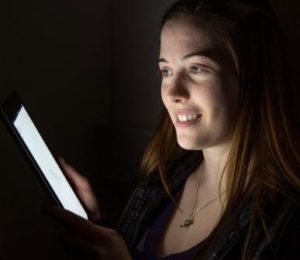 Teenagers who use an iPad for an hour before bed are still likely to get a good night’s sleep, new research from Flinders University shows.
Teenagers who use an iPad for an hour before bed are still likely to get a good night’s sleep, new research from Flinders University shows.
The study, led by sleep psychologist Dr Michael Gradisar, has found that moderate iPad use immediately before bed will not affect a teenager’s sleep, contrary to popular literature which suggests iPads, mobile phones and televisions stimulate the brain and disrupt sleep.
Conducted by Dr Gradisar’s honours students, the study measured the cognitive activity and sleep quality of 16 adolescents – aged between 14 and 19 – over the course of three weeks at the University’s newly-built Sleep Research Laboratory.
The teenagers were asked to watch a movie or play a game on the iPad for up to one hour before their usual bedtime using the brightest screen setting, however Dr Gradisar said the light emitted from the tablet and the stimulation of their chosen activity had no effect on their sleep.
“We measured their alertness before sleep, their brain activity during sleep and the quality of their sleep, and all in all we found that one hour of iPad use had no effect on their sleep,” Dr Gradisar said.
“Technology use has always been the scapegoat for why teenagers are falling asleep later at night but I’m not sure that’s entirely true,” he said.
However Dr Gradisar said the iPad was not completely off the hook, with a report from the US revealing that two hours of tablet time significantly affected melatonin levels – the natural hormone responsible for regulating the sleep-wake cycle – in a group of 19-year-olds.
“When the teenagers used the iPad for an hour before bed on full brightness there was no marked reduction in melatonin, which is in line with our results, but after two hours there was a significant reduction in melatonin levels.
“While the US research didn’t measure sleep, it found the iPad does supress melatonin so it’s likely that it would have an impact on sleep.
“But what both studies tell us is that we need to conduct more research to find out exactly what the safe amount of technology time is before bed.”
Dr Gradisar said the next step in his studies would be to test unrestricted iPad use, rather than limiting tablet time to an hour before bed.
“We’ve only told the teens to use it for an hour before their usual bedtime so testing unlimited use would give us a clearer indication of whether technology delays bedtimes because the user is more likely to lose track of time.
“While we can’t stop teenagers from using this technology, we might be able to inform them on when it’s best to use it and how much to use it.”

